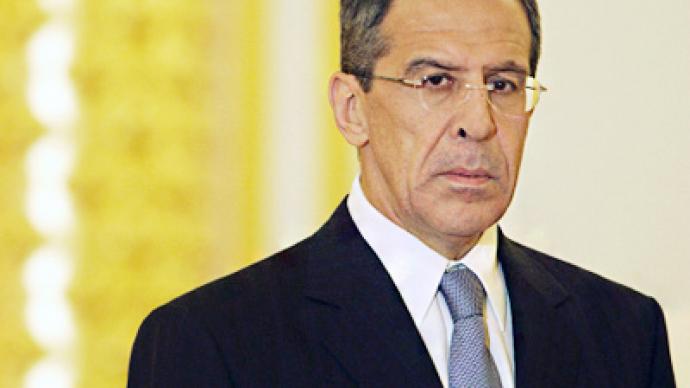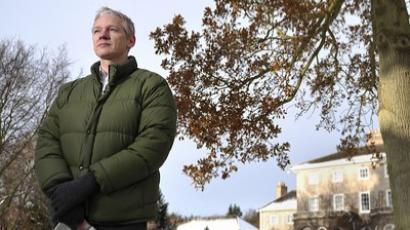“Maintaining positive line in relations with US is Russia’s key goal” – Lavrov

Russia and the US have more in common than they have differences, and keeping up the positive trend in bilateral relations is a crucial goal for Moscow, Russia’s top diplomat said, summarizing the results of the past year in diplomacy.
From a political point of view, 2010 has reaped a rich harvest of events, scandals and even breakthroughs.Russia has not been standing aside, getting its share of tragedies and victories – from living through the March Metro terrorist acts, the shocking crash of the Polish president’s plane near Smolensk and the deadly summer heat, to enjoying the much-hyped “reset” between Russia and the US and sealing the New START treaty. “We have had very intensive co-operation with the US [in 2010]. Last year demonstrated that the reset policy which was agreed by the Russian and US presidents has been fruitful,” Sergey Lavrov said. “We have all heard about the [New] START treaty, and there has been another treaty on the peaceful use of the nuclear energy; we’ve concluded negotiations on Russia’s accession to the WTO, and there are more and more American innovative companies which will be involved in the Skolkovo innovation projects.”“A presidential committee has also been set up and there are 18 working groups there which encompass all areas of Russia-US co-operation starting from military and diplomatic, and ranging to cultural and scientific issues. We have had more productive partnership in global issues, more intensive contacts in the G20, the G8, the UN and in the Russia-NATO Council,” Lavrov added.Read the details in Major events of 2010 through the lens of Russian diplomacyThe Russian Foreign Minister said that Russia-US relations had been in stagnation for a long time, but now that spirit is over.“We will stick to the policies set up by our presidents. We have to respect each other’s agreements and to meet each other’s concerns,” he said. “We’ve talked a lot about missile defense. We have more common interests with the US now. I hope that our relations won’t be undermined by any internal political maneuvers.”In terms of Russia’s co-operation with NATO – NATO is not Russia’s strategic partner, Lavrov said, but at the summit of the Russia-NATO Council in Lisbon a goal was set to move in the direction of strategic partnership.“It’s a breakthrough. It’s the first time that this task has been set up by the heads of Russia and the NATO member states, and we believe that it’s in our common interest to move towards this new level of relations,” the Russian Foreign Minister said. “We’d like Russia’s relations with NATO to be rid of stereotypes. We want to listen to each other and we don’t want any non-existent problems to be artificially involved.”“I want to give just an example, concerning Russia’s military doctrine,” he said. “You have probably read that this doctrine considers NATO as a threat to Russia’s security. President Medvedev, myself and many other top officials have repeatedly explained what this doctrine really says. NATO is not mentioned there as a threat to Russia. The doctrine says that NATO’s aspiration, in its transformation process, to assign itself the function of the use of force in any region of the world, thus breaching international law and UN charter – that’s a threat to Russia. But many of our partners, with insistence that I don’t understand, keep saying that Russia has declared NATO a threat to itself. The last time I read it was in a very much-respected US magazine ‘Foreign Affairs’. The main thing is to hear each other and understand what the other side says. And when some virtual reality is being created, a question arises if someone wants to undermine the development of strategic partnership between Russia and NATO. The majority of challenges that Russia and NATO member countries face are common challenges, and we have common goals in the field of security.”Russia’s co-operation with its partners in the Euro-Atlantic zone will largely depend on how the European anti-missile defense system develops, said Lavrov.At the same time, the Russian FM noted that when it comes to security issues an overall positive dynamic is evident in this region.Russia’s top diplomat also said that the creation of a joint Russia-NATO anti-ballistic missile system would have been a good test of the sincerity of Moscow’s statements that security is indivisible.
Nuclear disarmament – goals and hurdles
Speaking on the issue of nuclear disarmament, Lavrov stressed that talk of further steps in this direction are premature, as first of all Russia and the United States have to fulfill the obligations stipulated in the New START treaty.Sticking to the topic of nuclear disarmament, the Russian FM said Moscow thinks the level of Tehran’s co-operation with the IAEA is not sufficient. He emphasizes that this is one of the main issues of global security.According to Lavrov, one of the factors amplifying its seriousness is the artificial acceleration of tensions around this problem.He also reiterated Moscow’s stance that there is no alternative to the peaceful resolution of Iranian nuclear issue.“There are no problems that can be solved by the use of force. Even in those cases when force was used the parties had to eventually sit down at the negotiations table and talk. I hope those who make decisions will take a responsible approach, understanding the disastrous consequences the use of force would lead to in this extremely volatile region.”
Khodorkovsky case – pragmatism should prevail
The verdict in the second case against Mikhail Khodorkovsky and his business partner Platon Lebedev is another major event of 2010 Sergey Lavrov had to comment on.On the December 30, they were sentenced to 13.5 years in prison each.The Russian FM dubbed the European Parliament’s reaction to the sentencing as inappropriate. “For obvious reasons I cannot give any political assessments. First of all because this case is not over yet – the verdict has been appealed,” said Lavrov, adding, “Commenting in this issue, as the European Parliament has attempted to do, is inappropriate.”He also expressed hope that pragmatism will prevail and Russia’s partner states in the West will not allow the verdict in Khodorkovsky’s case to foil relations between the sides.
No swap for Bout
Sergey Lavrov also touched upon the case of Viktor Bout, who is standing trial in the US. The Russian Foreign Minister said no possibility of a swap is being discussed in regard to Bout, and Russia is not commenting on the case against him – only on the procedure of extradition of the Russian citizen to the US, which was conducted with breaches of international law and of Thai law.“Also, Viktor Bout’s wife, who arrived in the US with a valid visa, was kept for several hours in the airport and interrogated, her things searched. Unacceptable methods were used during the interrogation,” Lavrov said, adding that the Russian Foreign Ministry lodged protests with their US partners concerning the issue.
Report on Kaczynski’s plane crash
With the Interstate Aviation Committee (IAC) completing its investigation of the Polish President’s plane crash and releasing the final report on the January 12, this topic was raised by the Polish media.Sergey Lavrov refused to comment on the results of the technical probe, saying it was not the place of the Russian Foreign Ministry to do so.He stressed however that it has been it was conducted in accordance with international norms set out in the Chicago Convention. Lavrov also emphasized that it is not correct to call it “a Russian investigation,” responding to the numerous times it has been labeled as such by Polish media and officials.“It has been conducted at the request of the Russian and Polish governments, has been undertaken by an international committee – and when our Polish colleagues say it is a Russian investigation, it is not that. That is not true. It is an interstate institution. It is an independent center. And this technical commission based its conclusion on the opinions of experts from Poland, from Russia, from the CIS and from the US too. And also some international organizations were part of the investigation.”He also expressed his hopes that “there will be no speculation” about this accident, and that Moscow and Warsaw will continue their co-operation."I hope there will be no speculation, no one will try to score political points, and the policy that has been adopted and agreed upon during President Medvedev’s visit, as well as all the agreements, will be fulfilled.”














